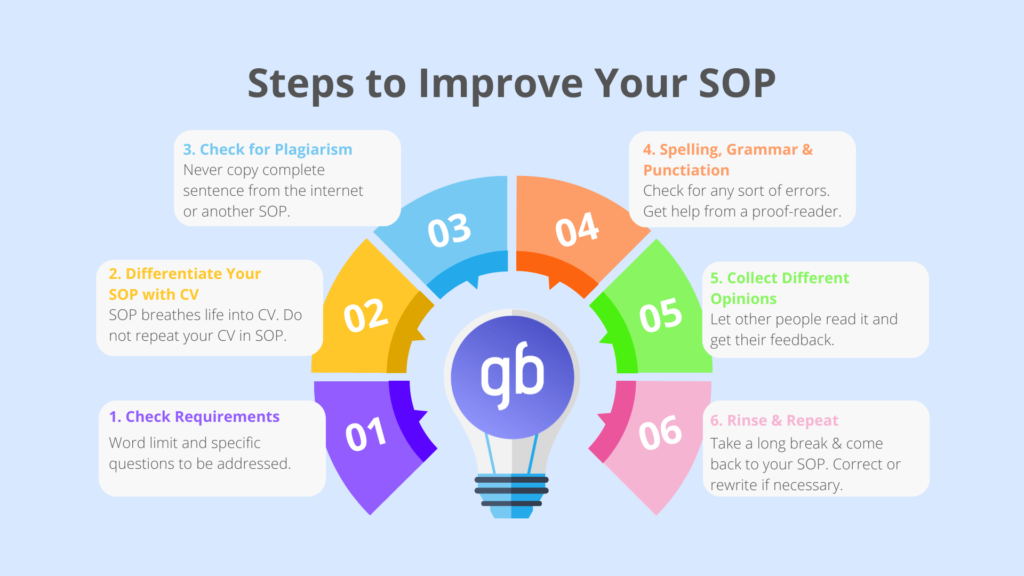A statement of purpose (SOP) is a tool to gauge the knowledge, experience, motivation, intellectual maturity and readiness of applicants to pursue graduate education. It is a critical component of the graduate school admissions process which determines whether an applicant is accepted or rejected, irrespective of their other qualifications. Here we have listed most common mistakes that you should avoid while writing a statement of purpose (SOP).
Avoid using childhood stories:
Childhood stories are good to tell to your kids, not in the statement of purpose — it makes a document less considerable. Not everyone is a genius kid like Sheldon who would like to build small nuclear reactor at home; so it does not make sense when someone says at the age of 7–8 s/he was inspired to become a scientist or an engineer. If it were, you would get a Nobel Prize like Sheldon got — isn’t it? Following is an example that is emblematic of this issue:
When I was born, my mother gave me a glass ball to play with. I would lay and look at the prisms of light shining through my ball. At age 5, my father brought home our first computer and I disassembled it and then put it back together. It was then that I knew I wanted to become a computer scientist.
You spent four years in your undergrad school, and there is nothing interesting to tell behind your inspiration towards grad studies; so you just went back to your childhood — do you think it is credible? The answer is NO. None will believe you and on the top of that nobody would like to work with such a person who just started an important essay which is a white lie. Here is another example that I found from one of the SOP that i reviewed:
As a child, I used to feel very helpless whenever someone asked me what I wanted to do when I would grow up. I wanted to be so many things at the same time that I could never stick to one particular answer for this question. Being the daughter of an engineer, I also thought of becoming an engineer in my childhood even though I did not know much then what engineering is all about. I remember when I was in high school; I used to go to a car workshop with my father as our second hand car frequently needed servicing works. I always enjoyed going there and watching the mechanics doing servicing work. I developed a strong liking for physical tools and machinery since then
Writing SOP in the eleventh hour:
Prospective applicants, often, does not emphasize on investing time and effort to write the SOP. They think they will invest few hours copy-pasting from sample SOPs from the internet, then add something of their own and make a final draft. That’s not the proper way to write a SOP. It requires a lot of brainstorming and perspective to be able to write a SOP which engages your audience. Therefore, start writing one well a month before your application deadline.
Highlighting negatives:
In your writing, you should maintain positivity and highlight your learning form the past. You do not need to justify your poor academic performance or talk about backlogs unless you had an extraordinary circumstances such as ill-health or depression. Always try to avoid something that illustrates a sad picture of you while writing SOP.
Exceeding the word limit:
In your writing, you should maintain positivity and highlight your learning form the past. You do not need to justify your poor academic performance or talk about backlogs unless you had an extraordinary circumstances such as ill-health or depression. Always try to avoid something that illustrates a sad picture of you.
You must maintain the word limit; there is no other rule. If you fail to do so it is a clear sign of neglecting instructions which might lead you to the denial of you application. Unless specified, the general rule of thumb is to limit your SOP within 1.5 pages. A long SOP that solely focuses on your achievements will not hold the attention of the admissions committee who are reviewing close to 10,000 applications every season.
Using excessive jargon and technical terms in SOP:
Too much jargon or technical term will spoil your SOP. People working in the admission committee may not be in the same page; therefore, they will be confused while reading your SOP if it contains too much jargons. Only use technical terms to explain your motives clearly and let them know what you are planning to do.

Avoid being dishonest:
Avoid making up or exaggerating facts while writing SOP. There is always a chance that the admission committee will contact your referee and ask for verification. If you have a exceptionally true story, then do not hesitate to share it briefly; but never falsify a story to ensure your SOP stands out from the crowd.
Not proofreading and editing:
There is no perfect first draft — so, ask an expert to review and proofread your SOP once you are done. Proofreading ensures that you avoid making the following errors:
- Spelling mistakes
- Grammatical errors
- Punctuation errors
- Incoherent flow from one para to the next
Always ask a third person to review, because s/he will always be able to spot errors better than you. Also, ask them to give feedback and try to incorporate into your final draft. For more detailed guideline you can follow our another blog on writing statement of purpose.
Disclaimer: No A.I. was used to generate any portion of this write up.

